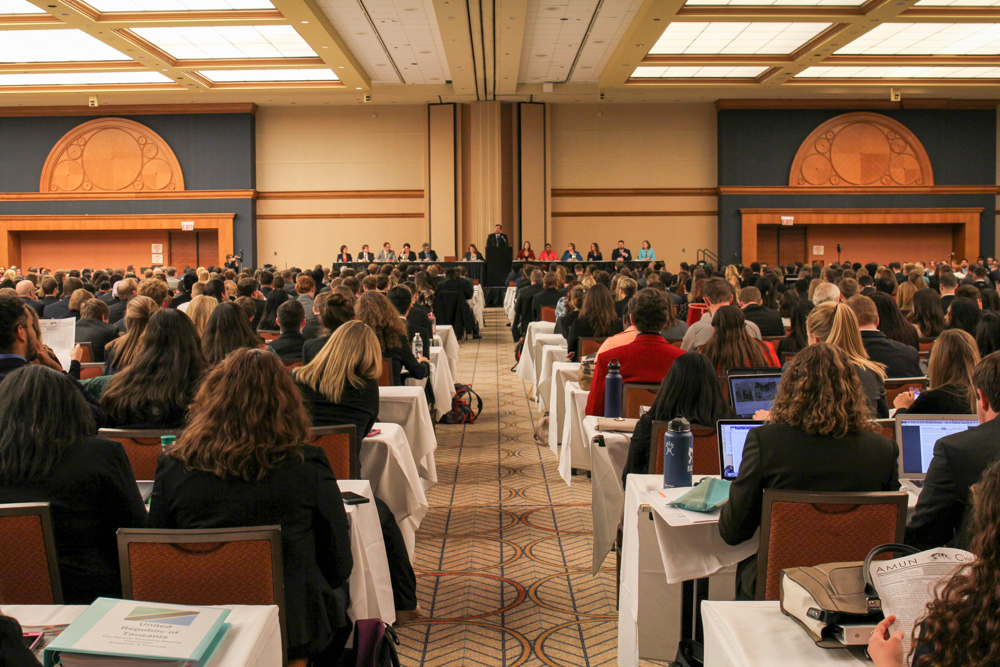
Announcing the 2018 AMUN Simulation Lineup

Today, we are happy to share the final list of simulations for the 2018 American Model United Nations Conference. The full list is below.
General Assembly
- General Assembly Plenary
- General Assembly First Committee
- General Assembly Second Committee
- General Assembly Third Committee
- General Assembly Sixth Committee
Specialized and technical bodies
- United Nations Environmental Assembly (UNEA)
- Executive Board of the World Health Organization (WHO)
- Committee for Development Policy (CDPEG)
- Commission on Population and Development (CPD)
Security Council
- Security Council
- Historical Security Council of 1948
- Historical Security Council of 1993
- Historical Commission of Inquiry of 2005
Simulations
- International Court of Justice
- International Press Delegation
 Still scratching your head?
Still scratching your head?
Here is the background on some of the bodies we are simulating in 2018.
The United Nations Environmental Assembly (UNEA) has universal membership, and was previously constituted as the United Nations Environmental Programme (UNEP). Though the body is available to all AMUN delegations, participation is optional and limited to one representative. The UNEA works to create constructive agreements on air, land, waterway, and ocean pollution and maintenance. This year’s UNEA simulation will present to the Combined General Assembly Plenary on their work during AMUN.
The World Health Organization Executive Board (WHO) is a specialized body with a mid-size membership. Delegations with membership on the body will be expected to have representatives present for the body’s deliberations. The WHO is the world’s foremost authority on public health. This year’s WHO simulation will present to the Combined General Assembly Plenary on their work during AMUN.
The Commission for Population and Development (CPD) is an ECOSOC body focusing on the impacts of population growth, population migration and the large demographic changes in population worldwide. It will have universal, voluntary membership and reports to a combined ECOSOC plenary session.
This year, for the second time, AMUN will simulate two bodies made up of non-governmental representatives. We made this change last year to reflect the changing reality of the United Nations, where civil-society and private-sector stakeholders are increasingly important. Private citizens have played a role at the United Nations for decades, but there are a growing number of formal opportunities for them at the United Nations.
The Committee for Development Policy Expert Group (CDPEG) is an ECOSOC expert group with limited membership. Its civil society representatives focus on issues of development on a practical level, such as the United Nations’ focus on sustainable development and its ability to incentivise private sector participation in the Sustainable Development Goals. The CDPEG will report to a combined ECOSOC plenary session.
The second is the Historical Commission of Inquiry of 2005 (COI), which will lead investigations on two crises: the International Commission of Inquiry for Darfur (Egypt, South Africa) and the Commission of Experts to Review the Prosecution of Serious Violations of Human Rights in Timor-Leste (India, Fiji). This 10-member group of experts will develop two reports. These experts serve in their personal capacity. Four countries will have been assigned to the body and selected during the 2018 Country Lottery; we will accept individual applications for the remaining six seats.
In 2018, the International Court of Justice will hear three cases: Application of the International Convention on the Elimination of All Forms of Racial Discrimination (Georgia v. Russia), International Court of Justice Fisheries Jurisdiction (Spain v. Canada), and the Advisory Opinion: Accordance with International Law of the Unilateral Declaration of Independence In Respect of Kosovo (Islamic Republic of Iran, Ireland, Kosovo, Serbia).
Keep Up With The Accords
More to read
The AMUN Accords is a premier resource for fact-based Model United Nations simulations. We are always looking for new contributors. Want to write for the AMUN Accords? Check out out the submission guidelines and then get in touch!


